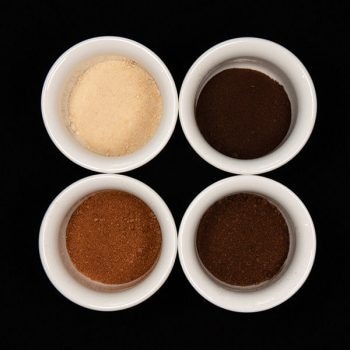Reviewed by Danielle Ellis, B.Sc.Dec 13 2023
The time might be approaching to embrace the aroma of lab-grown coffee brewed from cultivated plant cells.
 When coffee plant cells grown in a bioreactor (top left) are roasted (top right and bottom powders), they develop colors similar to conventional light or dark roast coffee. Image Credit: Adapted from the Journal of Agricultural and Food Chemistry.
When coffee plant cells grown in a bioreactor (top left) are roasted (top right and bottom powders), they develop colors similar to conventional light or dark roast coffee. Image Credit: Adapted from the Journal of Agricultural and Food Chemistry.
However, the fidelity of flavors in beverages derived from this innovation compared to traditional coffee beans remains uncertain. A recent study published in the Journal of Agricultural and Food Chemistry by the American Chemical Society (ACS) sheds light on the subject, revealing that certain comforting aromas and flavors typical of regular coffee could be replicated through the roasting and brewing of coffee cell cultures.
Coffee, a globally cherished beverage, is anticipated to witness the production of 23 billion pounds of beans in the 2023–24 growing season, as per the US Department of Agriculture. However, the cultivation of coffee faces growing threats due to climate change, with specific temperature and altitude requirements for optimal growth.
Exploring lab-grown coffee plant cells as an alternative to traditional beans dates back to the 1970s, but scant research has delved into how laboratory-produced products compare in taste and scent to their conventional counterparts.
Addressing this gap, Heiko Rischer and colleagues conducted a study to assess the impact of roasting coffee plant cells on both the cells themselves and the resulting beverage.

Image Credit: portumen/Shutterstock.com
The researchers initiated the process by culturing cells from chopped Coffea arabica leaves in a laboratory-scale bioreactor. Subsequently, the cells underwent freeze-drying, were ground into a fine powder, and were roasted under three different conditions. Prolonged roasting times resulted in colors akin to dark roast coffee beans, a crucial factor for flavor perception.
Notably, the current lab-grown powders exhibited twice the caffeine content compared to previous bioreactor coffee products, although still considerably lower than that found in conventionally farmed beans.
The team proceeded to brew beverages using the roasted cell cultures alongside dark roast C. arabica beans, serving them to trained taste-testers. Key findings included:
- Panelists detected similar levels of bitterness and sourness in lab-grown and conventional beverages.
- The newly created brews featured heightened roasted, burnt sugar, and smoky aromas.
- Some Maillard reaction products crucial for the distinctive flavor of coffee, such as guaiacol and certain pyrazines, were absent in the cell-based drinks, although other Maillard reaction products were present.
While the study demonstrated that certain tastes and aromas akin to those found in traditional coffee could be achieved through roasting cultured cells, the researchers emphasize the necessity for future investigations into processing techniques to further enhance the flavor profile of this alternative to conventionally grown coffee.
Source:
Journal reference:
Aisala, H., et al. (2023) Proof of Concept for Cell Culture-Based Coffee. Journal of Agricultural and Food Chemistry. doi.org/10.1021/acs.jafc.3c04503.